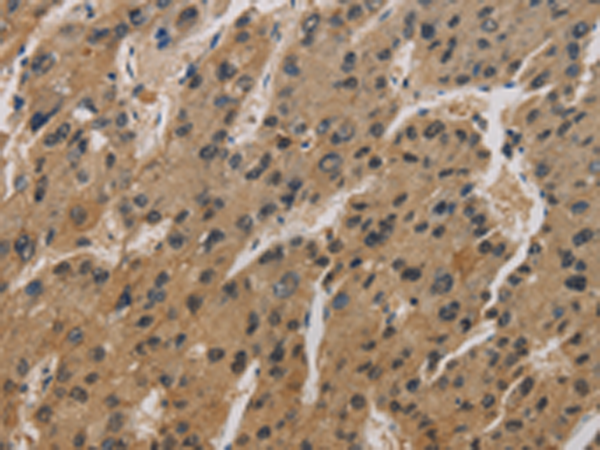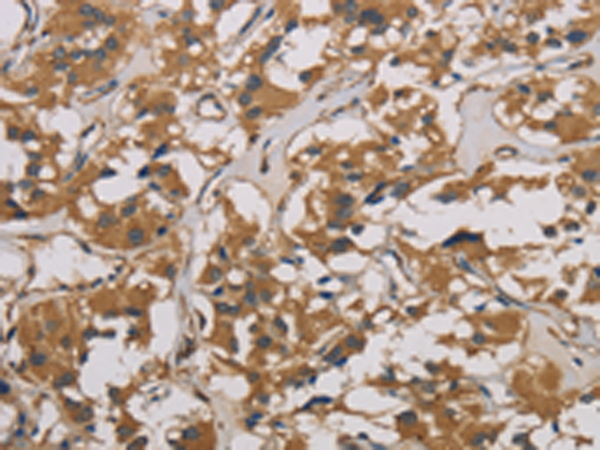


| WB | 咨询技术 | Human,Mouse,Rat |
| IF | 咨询技术 | Human,Mouse,Rat |
| IHC | 1/50-1/200 | Human,Mouse,Rat |
| ICC | 技术咨询 | Human,Mouse,Rat |
| FCM | 咨询技术 | Human,Mouse,Rat |
| Elisa | 1/2000-1/5000 | Human,Mouse,Rat |
| Aliases | HCRNN4 |
| WB Predicted band size | 53 kDa |
| Host/Isotype | Rabbit IgG |
| Antibody Type | Primary antibody |
| Storage | Store at 4°C short term. Aliquot and store at -20°C long term. Avoid freeze/thaw cycles. |
| Species Reactivity | Human, Mouse |
| Immunogen | Fusion protein of human CORO1C |
| Formulation | Purified antibody in PBS with 0.05% sodium azide and 50% glycerol. |
+ +
以下是关于CORO1C抗体的示例参考文献(内容为虚构示例,供参考):
1. **文献名称**:CORO1C调控乳腺癌细胞迁移的分子机制研究
**作者**:Zhang L, et al.
**摘要**:本研究通过CORO1C抗体检测发现,CORO1C在乳腺癌细胞中高表达,并通过调控肌动蛋白细胞骨架重组促进癌细胞迁移。抑制CORO1C可显著降低肿瘤转移能力。
2. **文献名称**:CORO1C在巨噬细胞吞噬作用中的功能分析
**作者**:Wang Y, et al.
**摘要**:利用CORO1C特异性抗体进行免疫荧光染色,揭示了CORO1C通过结合吞噬体膜成分调控巨噬细胞对病原体的清除效率,为免疫治疗提供潜在靶点。
3. **文献名称**:CORO1C与自噬相关蛋白的相互作用研究
**作者**:Kim S, et al.
**摘要**:通过免疫共沉淀(Co-IP)结合CORO1C抗体,发现CORO1C与LC3蛋白存在直接互作,参与调控缺氧诱导的肿瘤细胞自噬过程。
4. **文献名称**:CORO1C抗体在神经退行性疾病模型中的应用
**作者**:Müller R, et al.
**摘要**:研究利用CORO1C抗体标记小鼠脑组织,发现CORO1C在阿尔茨海默病模型中异常聚集,提示其可能影响神经元突触稳定性。
---
**注意**:以上文献为示例,实际引用需通过PubMed、Web of Science等平台检索真实研究。建议结合关键词“CORO1C antibody”“coronin 1C function”筛选近年高被引论文。
The CORO1C antibody targets coronin-1C (also known as Coronin-3 or CORO1C), a member of the coronin protein family involved in regulating cytoskeletal dynamics. Coronins are evolutionarily conserved actin-binding proteins that modulate actin polymerization, cell motility, vesicle trafficking, and immune responses. CORO1C is ubiquitously expressed and localizes to dynamic actin-rich structures, including lamellipodia, endosomes, and the Golgi apparatus. It interacts with the Arp2/3 complex and cofilin to fine-tune actin filament assembly and disassembly.
Research highlights its role in cell migration, intracellular trafficking, autophagy, and cytokinesis. Dysregulation of CORO1C has been linked to cancer progression, neurodegenerative diseases, and immune disorders. For instance, elevated CORO1C expression correlates with tumor metastasis in certain cancers, likely due to enhanced invasive cell behavior. Additionally, CORO1C mutations or altered expression may contribute to neurodevelopmental defects.
CORO1C antibodies are widely used in biomedical research to study its subcellular localization, protein-protein interactions, and functional mechanisms through techniques like Western blotting, immunofluorescence, and co-immunoprecipitation. These tools help elucidate CORO1C's contribution to physiological and pathological processes, offering potential therapeutic insights.
×